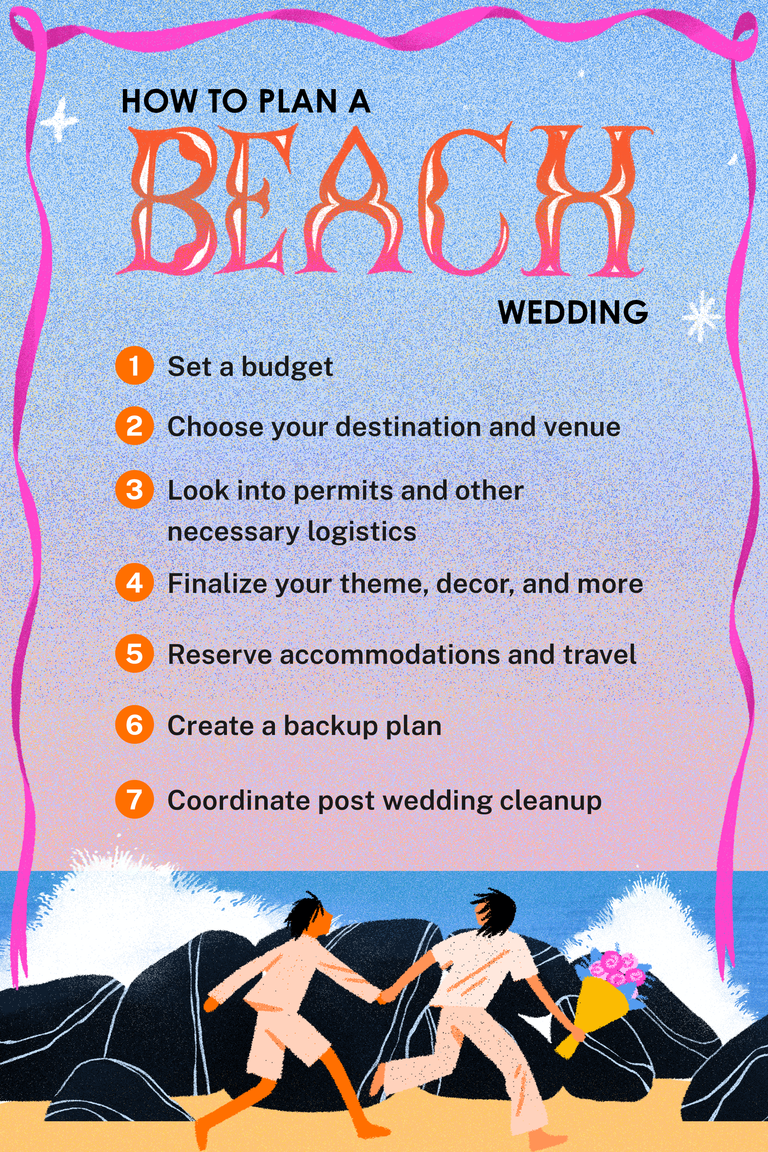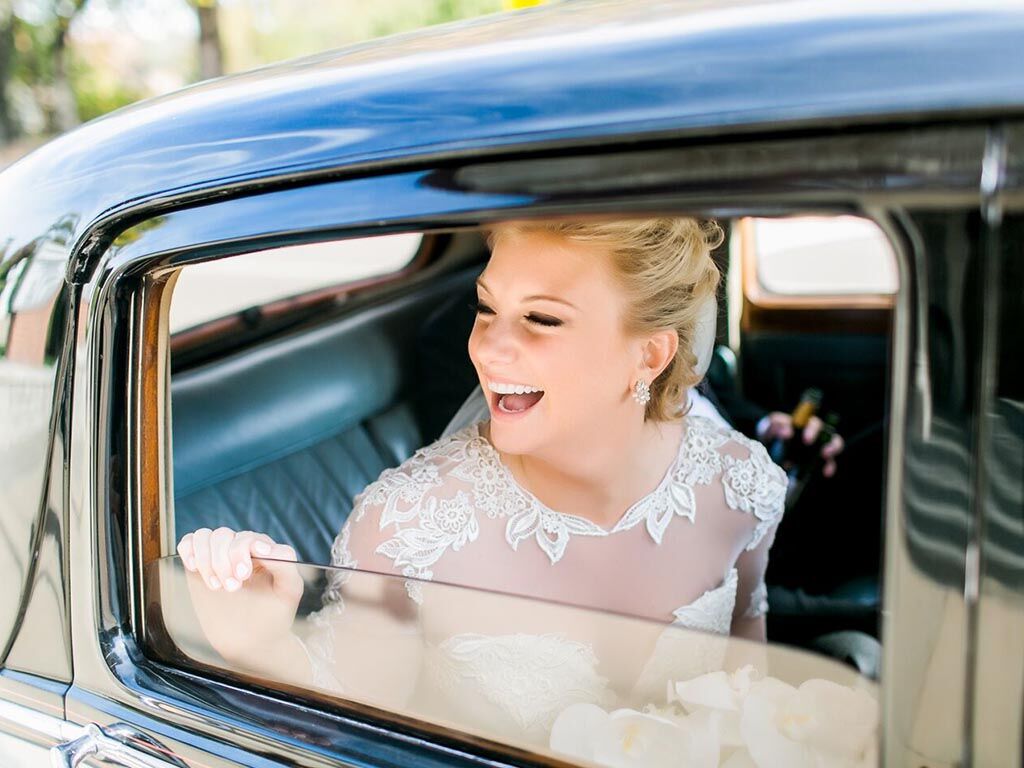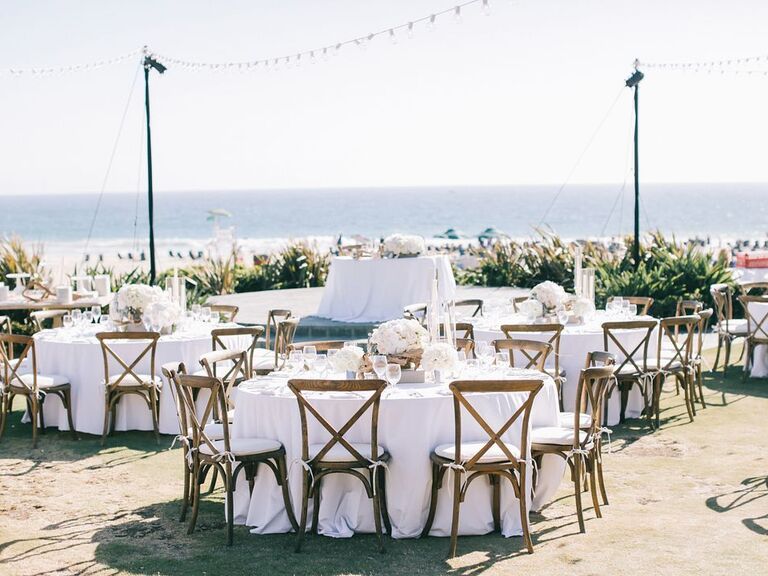Everything You Need to Know About Planning a Beach Wedding

No matter the time and place, planning a wedding takes dedication and work. And while planning a beach wedding isn't necessarily harder, it does involve a few unique considerations and adjustments that differ from weddings at traditional venues. But don't let that deter you from having your dream beach wedding, because in the end, it will all be worth it when you're exchanging your vows in front of a beautiful ocean backdrop. We consulted with a few pro planners who specialize in beach weddings to get their best beach wedding tips and advice, whether you're just starting out or need some last-minute guidance. When you've got all the logistics worked out, you can move onto the next step—browsing inspiration and saving your favorite beach wedding ideas.
What to Know About Planning a Beach Wedding:
How to Plan | Tips | Etiquette
How to Plan a Beach Wedding
Ready to dive in? Here's a play-by-play of how to get married on the beach and what you need to know about planning a beach wedding.

1. Set a budget.
Setting the budget is the first step when planning any wedding, even if you already know you want to get married at the beach. A buttoned-up budget will give you a realistic look at the types of venues and vendors that are available in your price range, and how much flexibility you have for other expenses, like furniture rentals, permit costs (more on this in just a minute) and attire. Your wedding budget will also help you determine whether you want to prioritize venues that offer beach wedding packages, which can sometimes help you save money depending on the situation, or if you'd rather hire all of your vendors à la carte.
Although it's another investment, a wedding planner is invaluable when it comes to beach wedding planning. They'll be able to help you allocate your budget in the most effective way, taking into consideration costs you might not have even thought about, like generators and sound equipment.
2. Choose your destination and venue.
Maybe you've decided to have a beach wedding because you already have a specific location in mind, so in that case, you can take this step with a grain of salt (or should we say sand). Otherwise, start by creating a shortlist of potential beach wedding venues that you want to look into further. Are you willing to travel abroad to a venue in Cancun or the Caribbean? Or would you rather keep your wedding stateside to avoid passport requirements and international logistics?
Pay close attention to seasonality and weather patterns when making your final decision. For example, if you're set on getting married during the summer, planning a destination wedding in the Caribbean at the height of hurricane season comes with some possible risk. Escaping the cold winter months to get married in Hawaii sounds perfect, but keep in mind that the state's highest rainfall usually happens between October and April. On the other hand, a wedding during the off-season in a small beach town could make it more difficult to find vendors and accommodations. Once you've zeroed in on a location, head to The Knot Vendor Marketplace to start browsing beach wedding venues by destination, price and guest capacity.
Beach Wedding Venues by State: California | North Carolina
Beach Wedding Venues by City: Clearwater Beach | Daytona Beach | Delray Beach | Huntington Beach | Long Beach | Miami Beach | Myrtle Beach | Newport Beach | New Smyrna Beach | Palm Beach | Rosemary Beach | St. Pete Beach | Vero Beach
3. Look into permits and other necessary logistics.
Before you make any official plans, brush up on the local requirements for outdoor events. "Many beaches require permits and/or access fees for an event on the sand, which typically range from $250 to $450," says Laura Kaatze, a wedding planner at Tide the Knot Beach Weddings in Tampa, Florida. This is especially the case for private beaches and protected waterfront areas, like nature sanctuaries or residential neighborhoods. Kaatze, who specializes in beach wedding planning, vow renewals and elopements, says that her team handles the permit logistics and rolls the cost into the couple's final invoice—something that most other wedding planners also usually offer.
Kaatze mentions it's important to understand that it's not always possible to close off public access to the beach, even with a permit. "We are not authorized to block off a larger space to deter beachgoers from enjoying the sand," she says. "But in all the weddings we've orchestrated over the years, rest assured that beachgoers have never disrupted the serene ambiance." She recommends choosing an optimal day or time of year when crowds won't be as big so you can enjoy a more tranquil, private ceremony.
On top of getting the permit approved, you might also need to follow local noise regulations and light restrictions (for example, reducing light pollution during sea turtle nesting season or near migratory bird habitats). Finally, consider if anyone in your group has accessibility needs that would require special accommodations, like installing a temporary ramp or walkway on the sand.
4. Finalize your theme, decor and more.
Most beach wedding venues are a blank slate, especially if you're actually getting married on the beach, which leaves a lot of room for creativity. "It allows couples to truly customize the look of their wedding ceremony," explain Samantha DeFeo and Taylor Williams, co-owners and event planners at Coastyle Weddings & Events in the Outer Banks. "Couples can choose to be minimalistic or extravagant because they already have a beautiful backdrop. Not to mention it makes for spectacular photos!"
Vibrant beach wedding colors are great for bringing a lively, high-energy vibe to the day, and they easily stand out in the bright sunshine. For a nautical wedding theme, go with a color palette inspired by sailing flags, like red, navy blue, green and yellow. Pastels and neutrals will blend into the beach scenery for an elegant, chic look. Choosing your decor is the fun part about planning a beach wedding, but color palettes and flower arrangements are only the beginning. Unlike a traditional indoor venue, planning a beach wedding means you'll need to account for some additional technical details, like providing shelter for guests and bringing in enough power supply for lighting and audio.
5. Reserve accommodations and travel.
Unless you're lucky enough to live close to your beach venue, you'll probably need to make travel arrangements and book accommodations for the days surrounding the wedding. Plan to do this as far in advance as possible, especially if you're getting married in a popular tourist destination or vacation spot. You'll also need to let your guests know far enough in advance for them to make the same arrangements. Plan to send your save-the-dates at least six months before your wedding, or closer to eight months or a year in advance for a faraway beach destination. If you want to host any prewedding events, like a rehearsal dinner or welcome drinks, be sure to make arrangements for those, too.
6. Create a backup plan.
No matter how much time you spend on the details, chances are that some things won't go as planned on your big day (and that's totally normal). From hurricanes to unexpectedly high tides and heat waves, beach weddings have more variables up in the air compared to other venues, but you can avoid disaster with a bit of planning. For your own peace of mind, work with your planner or venue coordinator ahead of time to iron out a Plan B—and even a Plan C—in case there's inclement weather on the wedding day and your original beach wedding plans are no longer feasible. Once you have a backup plan in place, share it with the rest of your vendor team along with friends and family who are involved in the planning process. You can also include a short note on your wedding website to let guests know that inclement weather is a possibility and that you'll let them know in the event that the original plans change.
7. Coordinate postwedding cleanup.
Most venues have in-house staff who can help with cleanup at the end of the night, but if you're getting married on a public beach, that won't be the case. Unless you're heading indoors to a nearby beach resort or banquet space for the reception, you'll need to decide who's responsible for things like trash removal, decor breakdown and making sure that nothing's left behind on the beach. Some vendors, like your caterer and band or DJ, will handle their own equipment, but a wedding planner can coordinate all of the other details.
Beach Wedding Tips
With your main wedding checklist in hand, here are a few more important things to keep in mind when you're getting married on the beach.
Hire an experienced team of vendors.
Working with a beach wedding planner is a great start, but it's important that the rest of your vendors have prior experience with beach weddings, too. The logistics of beach wedding setup can be a little more complicated than you might think, particularly if the venue has a lot of local regulations or is in a remote location. Vendors who are familiar with the potential challenges of beach weddings can anticipate problems before they get too out of hand, and they'll know exactly how to navigate any other tricky situations that come up.



Pick the right time of day.
Not only is it important to choose the right time of year for a beach wedding, but you'll also need to be strategic about the time of day that you're getting married. "Weekends and holidays tend to attract a surge of beachgoers," says Kaatze. "If you're planning a wedding, book early for Saturdays and sunset ceremonies, as they fill up quickly, sometimes even a year in advance. To escape crowds and the warmer temperatures, consider weekday events—either mornings or at sunset."
And don't forget about tide times, either. Check tide charts to determine exactly when and where your beach ceremony should take place to avoid an unexpected flood at high tide. Use the local coast guard or a reliable website, like the National Oceanic and Atmospheric Administration (NOAA), which releases tide prediction times on a daily and yearly basis.
Use decor and other items that can hold up to the elements.
Outdoor weddings are more prone to the ups and downs of Mother Nature, especially by the water where wind gusts and unexpected storms are more common. "The most important thing to think about is the coastal environment," say DeFeo and Williams. "We encourage our couples to take into account the tide chart for timing, as well as to prepare for wind, or coastal storms that can roll through quickly."
This means that some items (like lightweight paper place cards) might be better left behind, while other decor might need a little more effort to set up or secure in place. "It's also smart to use good quality, sturdy rentals (chairs and arbors) and book local vendors who have expertise setting up and breaking down on the beach," according to DeFeo and Williams. When choosing your flowers, trust your wedding florist's judgment about which blooms will or won't stand up to the elements—for example, delicate flowers like hydrangeas are more likely to wilt in a beach wedding bouquet compared to tropical blooms, like lilies or orchids.
Choose a menu that reflects the location and climate.
A bowl of hot seafood soup might be comforting at a chilly New England wedding on the water, but it doesn't have the same effect in the hot Florida sun. Work with your catering company to feature locally inspired dishes and drinks that make sense for your specific venue. Speaking of caterers, it's crucial to choose a catering company and wedding cake baker who have experience with off-site catering and beach weddings. White sand may be picturesque, but no one wants it to come in contact with their dinner, and especially not their wedding cake. During your catering tasting, ask how the company has handled beach weddings in the past and inquire about what kind of equipment they would need to bring in—and how that could affect your overall cost.
Provide extra amenities for your guests.
From Uber codes to wedding favors, guests always appreciate small tokens of your affection throughout the wedding day. When it comes to asking friends and family to sit in the hot sun for your nuptials, it's especially important to consider the guest experience and how you can make their day as enjoyable as possible. Set them up with wedding welcome bags filled with thoughtful essentials, like sunscreen, bug spray, sunglasses and pashminas or Turkish towels in case the temperatures drop at night. Although guests came to the beach to see you wed, little details like this will turn their trip into a restful getaway as well.
Depending on your venue, there are a few less glamorous amenities you'll need to consider, too. The first (and most important) one: Make sure you have enough restroom facilities for the number of guests attending, even if that means you have to rent portable bathrooms. Next, plan ahead for extreme temperatures and be ready to provide space heaters or portable fans and shaded areas as needed. Finally, take extra precautions to keep guests safe by making sure that your venue is well-lit, especially if there isn't an established path or boardwalk.
Beach Wedding Etiquette
Now that we've outlined how to have a beach wedding, let's get into the etiquette specifics. Here are our thoughts on a few beach wedding FAQs, like how much a beach wedding might cost, what you should wear and if you can get married on a public beach.
Can you have a wedding on the beach?
Yes, you can have a wedding on the beach, but the exact permissions and restrictions will vary depending on the location. Weddings are allowed on most public beaches across the country, while you may need special permission or a direct connection to get married on a private beach. If you're planning a destination beach wedding outside of the U.S., check the local regulations before moving forward.
Do you need a permit for a beach wedding?
In many cases, you'll need a permit for your beach wedding, but the exact answer depends on where you're getting married. Special event permits are required if you want to have a beach wedding in a national park, as well as many public and private beaches across the country. The permit application process and fees vary by location, so consult the local government for specifics to make sure you have everything legally squared away. Some beachfront venues and wedding planners will handle the permit paperwork for you as part of their services.
Is it a good idea to have a beach wedding?
There are a lot of perks to beach weddings, including beautiful water views, fresh ocean air and room to spread out. It's a good idea to have a beach wedding if you know you want to get married outdoors and you understand that outdoor weddings come with some risk, like unexpected weather. Beach weddings are also popular for elopements and vow renewals, since they tend to be more relaxed and ideal for small groups. With the help of your wedding vendors, you'll be prepared for anything and ready to have the beach wedding of your dreams.
How much is a beach wedding?
According to our company data, the average wedding cost is $35,000, but this changes depending on the location, time of year and type of wedding. Are beach weddings expensive compared to non-beach weddings? Yes and no. Small beach weddings can cost much less, especially if you're holding a short ceremony on the beach followed by an informal reception elsewhere. Because of this, beach elopements and vow renewals are a popular choice for couples who are looking to save money on their wedding budget. On the other hand, hosting an elaborate wedding ceremony and reception on the beach can sometimes cost more due to the equipment, supplies and decor you'll need to transport to your chosen location. Don't forget to factor in the cost of a beach wedding permit (if required), which is usually a few hundred dollars.
What time is best for a beach wedding?
The best time of day for a beach wedding is before midday or a few hours before sunset. According to DeFeo and Williams, the season, sunset times and the tides will impact exactly when your beach wedding should take place. In the winter months, shorter days could mean a ceremony start time around 3 p.m. or 4 p.m., while you can start closer to 5 p.m. or 6 p.m. in the summer months.
What is the best month to have a beach wedding?
The best month to have a beach wedding will depend on where you're getting married. In general, you can expect most beaches to be crowded with tourists and vacationers during the summer months, which can create a headache for you and your guests. The shoulder seasons—early spring and early fall—are less crowded, but weather could be an issue depending on the location. In the north, cooler temperatures can limit the beach wedding season to just a few months between April and September. Areas that are further south, like Florida and southern California, tend to be mild enough for beach weddings year-round.
Beach Wedding Attire Considerations
The sun and wind on the beach will impact most parts of your wedding day, fashion and beauty included. When it comes to beach wedding attire, comfort should be top of mind—for couples and for guests. Look for beach wedding dresses made from flowy, lightweight fabric to stay cool in hot temperatures. For suits, consider a linen or cotton style that matches the laid-back vibe of the beach. Finally, opt for practical shoes like block heels, sandals or flats versus a pair of stilettos. If you've chosen a themed dress code (like festive tropical), include a short explanation on your wedding website so guests know exactly what to wear.






















